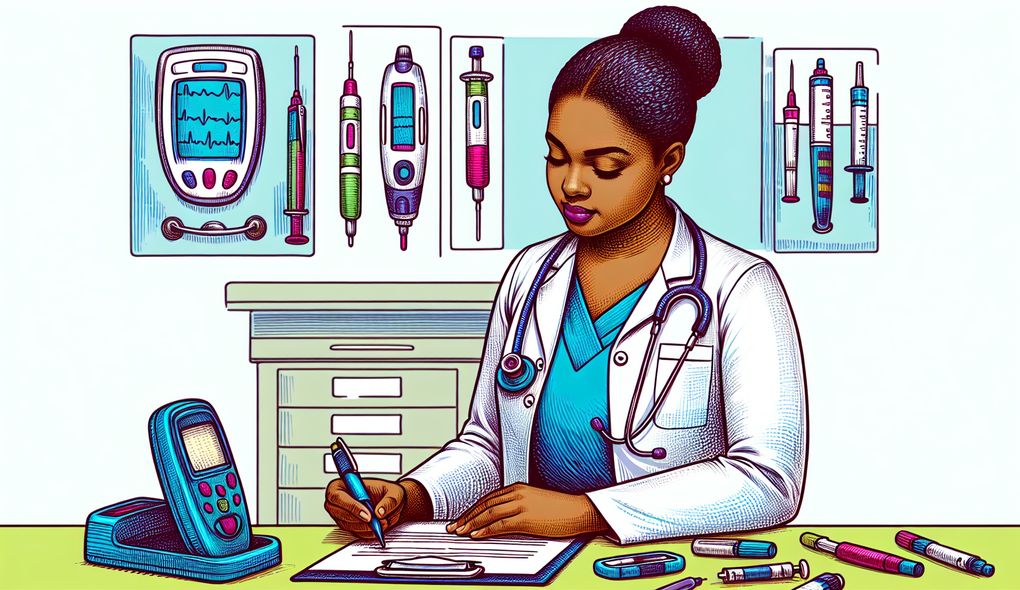How do you develop and implement treatment plans for endocrine-related conditions?
SENIOR LEVEL

Sample answer to the question:
When developing and implementing treatment plans for endocrine-related conditions, I first conduct a thorough patient assessment to understand their specific needs and condition. Then, I work closely with the patient and their healthcare team to create a personalized treatment plan that may include medication, lifestyle changes, and ongoing monitoring. I ensure that the plan is easily understandable for the patient and their family and provide education on disease management and prevention strategies. Throughout the treatment process, I regularly monitor the effectiveness of the plan and make necessary adjustments to optimize patient outcomes.
Here is a more solid answer:
As an experienced Endocrinology Nurse Practitioner, I approach the development and implementation of treatment plans for endocrine-related conditions with a comprehensive and patient-centered approach. I start by conducting a comprehensive patient assessment, which includes a detailed medical history, physical examination, and diagnostic tests. This allows me to gather all the necessary information to make an accurate diagnosis and understand the patient's unique needs. Based on the assessment, I develop a personalized treatment plan that addresses the specific endocrine condition and individual patient factors. The plan may involve a combination of medication, lifestyle modifications, and patient education. I ensure that the plan is tailored to the patient's understanding and provide clear explanations of the treatment goals and strategies. Additionally, I utilize electronic health record (EHR) systems to document and track the patient's progress, medication history, and any changes in the treatment plan. Throughout the treatment process, I regularly communicate with the patient, their family, and other healthcare professionals involved in their care to ensure coordinated and effective treatment. I also provide ongoing education and support to empower the patient to manage their condition and prevent complications. My strong leadership and team-management abilities enable me to work collaboratively with other healthcare professionals to ensure the best possible outcomes for my patients.
Why is this a more solid answer?
The solid answer provides a more detailed and comprehensive explanation of how the candidate develops and implements treatment plans for endocrine-related conditions. It demonstrates their knowledge and skills in patient assessment, diagnosis, treatment planning, patient education, and the use of electronic health record systems. However, it could still benefit from more specific examples to further illustrate the candidate's experience and expertise.
An example of a exceptional answer:
As a Senior Endocrinology Nurse Practitioner with over 10 years of experience, I have honed my skills in developing and implementing treatment plans for endocrine-related conditions to deliver exceptional patient care. My advanced knowledge of endocrine diseases and treatments allows me to accurately diagnose complex cases and develop targeted treatment plans. For example, in a recent case of a patient with uncontrolled diabetes and concurrent thyroid disorder, I conducted a comprehensive assessment, including a detailed review of the patient's medical history, thorough physical examination, and specialized laboratory tests. By analyzing the results and considering the patient's individual factors, I created a personalized treatment plan that involved optimizing their diabetes medication regimen, initiating thyroid hormone replacement therapy, and recommending lifestyle modifications. I ensured the patient's understanding by using clear language and visual aids, and provided them with educational resources to reinforce the plan. Throughout the treatment process, I utilized the electronic health record system to document the patient's progress and make timely adjustments to the treatment plan. I also collaborated with an endocrinologist and a registered dietitian to monitor the patient's glycemic control and provide comprehensive care. By adopting a multidisciplinary approach and leveraging my excellent communication and interpersonal skills, I facilitated effective care coordination and ensured optimal patient outcomes.
Why is this an exceptional answer?
The exceptional answer goes above and beyond by providing a specific and detailed example of how the candidate developed and implemented a treatment plan for a complex case of endocrine-related conditions. It showcases their advanced knowledge, expertise in patient assessment and diagnosis, personalized treatment planning, patient education, and collaboration with other healthcare professionals. The candidate's extensive experience and exceptional skills make them a highly qualified and competent candidate for the role.
How to prepare for this question:
- Review and refresh your knowledge of endocrine diseases and treatments, including the latest advancements in the field.
- Practice conducting comprehensive patient assessments and developing personalized treatment plans based on the assessment findings.
- Familiarize yourself with the use of electronic health record (EHR) systems and ensure proficiency in documenting patient information and tracking treatment progress.
- Enhance your patient education skills by reviewing resources, techniques, and strategies for effectively communicating complex health information to patients.
- Reflect on your previous experiences and cases related to endocrine-related conditions and treatment planning, and prepare specific examples to showcase your expertise during the interview.
What are interviewers evaluating with this question?
- Advanced knowledge of endocrine diseases and treatments.
- Excellent patient assessment and diagnostic skills.
- Ability to educate patients on complex health issues.
- Strong leadership and team-management abilities.
- Proficient in using electronic health record (EHR) systems.
- Outstanding communication and interpersonal skills.

